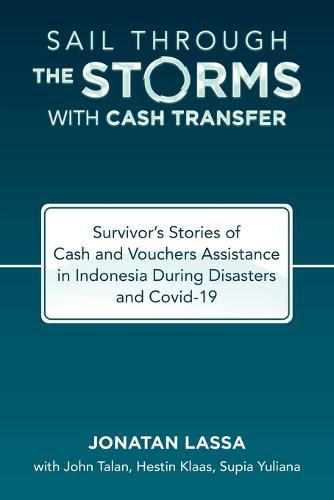Readings Newsletter
Become a Readings Member to make your shopping experience even easier.
Sign in or sign up for free!
You’re not far away from qualifying for FREE standard shipping within Australia
You’ve qualified for FREE standard shipping within Australia
The cart is loading…






This title is printed to order. This book may have been self-published. If so, we cannot guarantee the quality of the content. In the main most books will have gone through the editing process however some may not. We therefore suggest that you be aware of this before ordering this book. If in doubt check either the author or publisher’s details as we are unable to accept any returns unless they are faulty. Please contact us if you have any questions.
World Humanitarian Summit in 2016 call for humanitarian industries including the United Nations and NGOs to bolder promote the use of cash transfers in responding to disasters. This book documents experiences and collects personal accounts on disasters, COVID-19 and cash transfers from disaster survivors in Indonesia whose lives intersect with other survivors and humanitarian responders, ranging from local activists to NGOs' workers. The survivors are often labelled as 'project beneficiaries'. Cash assistance and disaster payments are temporary income for the affected community. It is no silver bullets despite their rich potential to reduce vulnerability and suffering. One of the promises of such assistance is that it can help both women and children survive and rebuild their lives after a crisis, be it from a natural catastrophe or man-made hazards. The question is how such assistance is understood in a fuller context of a survivor's complex life? To its critics, humanitarian cash assistance is like 'a drop of salt in the ocean' in that it is not enough to make a difference to disaster-affected people's lives. Nevertheless, the question is how a relatively small-size and temporarily distributed cash assistance within a short time window can significantly impact the beneficiaries' life at a particular time and places ruined by disasters? Survivors and beneficiaries are not just numbers. They are humans with stories worth listening to. This book shows that to what extent cash assistance can be of meaningful, they must be understood in a fuller context of people's lives, stories, including their wade dreams that go beyond the cold and dry quantitative evaluation measures that are often chasing the numbers with a certain percentage of Yes and No in agreeing or disagreeing about how good and helpful support is to the life of the crisis-affected people.
$9.00 standard shipping within Australia
FREE standard shipping within Australia for orders over $100.00
Express & International shipping calculated at checkout
This title is printed to order. This book may have been self-published. If so, we cannot guarantee the quality of the content. In the main most books will have gone through the editing process however some may not. We therefore suggest that you be aware of this before ordering this book. If in doubt check either the author or publisher’s details as we are unable to accept any returns unless they are faulty. Please contact us if you have any questions.
World Humanitarian Summit in 2016 call for humanitarian industries including the United Nations and NGOs to bolder promote the use of cash transfers in responding to disasters. This book documents experiences and collects personal accounts on disasters, COVID-19 and cash transfers from disaster survivors in Indonesia whose lives intersect with other survivors and humanitarian responders, ranging from local activists to NGOs' workers. The survivors are often labelled as 'project beneficiaries'. Cash assistance and disaster payments are temporary income for the affected community. It is no silver bullets despite their rich potential to reduce vulnerability and suffering. One of the promises of such assistance is that it can help both women and children survive and rebuild their lives after a crisis, be it from a natural catastrophe or man-made hazards. The question is how such assistance is understood in a fuller context of a survivor's complex life? To its critics, humanitarian cash assistance is like 'a drop of salt in the ocean' in that it is not enough to make a difference to disaster-affected people's lives. Nevertheless, the question is how a relatively small-size and temporarily distributed cash assistance within a short time window can significantly impact the beneficiaries' life at a particular time and places ruined by disasters? Survivors and beneficiaries are not just numbers. They are humans with stories worth listening to. This book shows that to what extent cash assistance can be of meaningful, they must be understood in a fuller context of people's lives, stories, including their wade dreams that go beyond the cold and dry quantitative evaluation measures that are often chasing the numbers with a certain percentage of Yes and No in agreeing or disagreeing about how good and helpful support is to the life of the crisis-affected people.